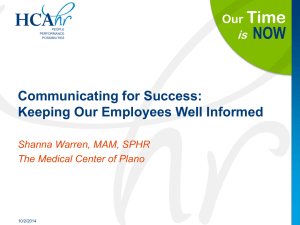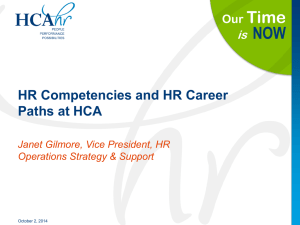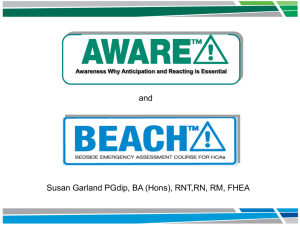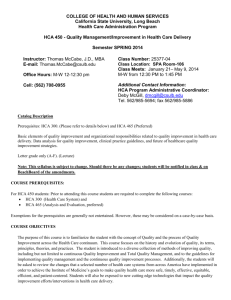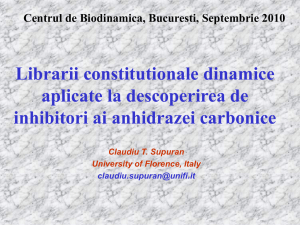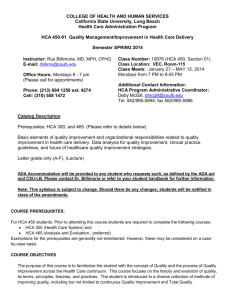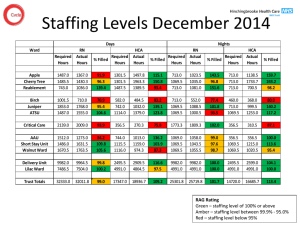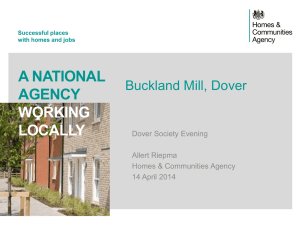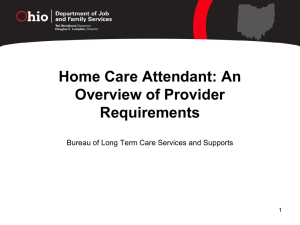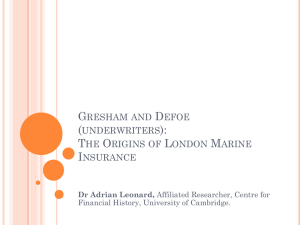HCA Land - Civil Service
advertisement
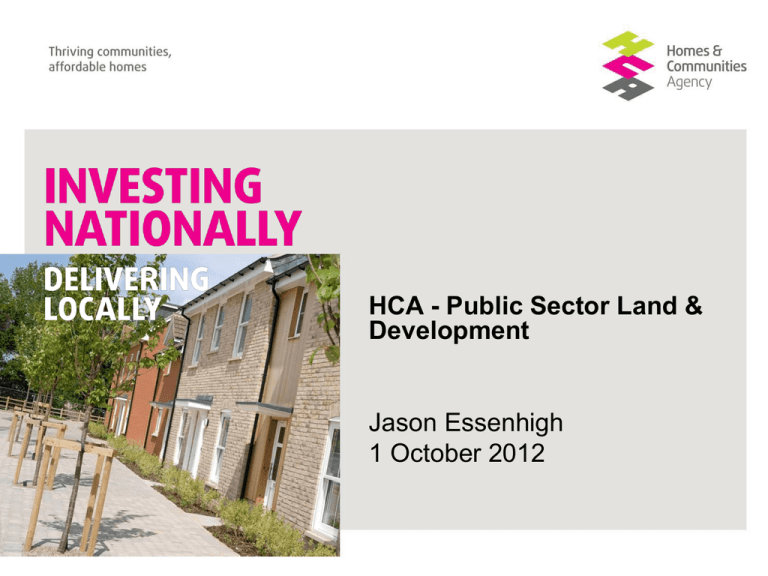
HCA - Public Sector Land & Development Jason Essenhigh 1 October 2012 Scope of presentation The HCA’s role Land asset ‘family tree’ Our assets and their value Market challenges The HCA role We are the people who help get things done… Working with people and places to enable them to deliver homes, economic growth and jobs Delivering programmes of investment Making best use of our land and that of government/ other public bodies Undertaking robust economic regulation of social housing providers HCA Purpose: to contribute to economic growth by helping communities to realise their aspirations for prosperity and to deliver quality housing that people can afford Current delivery context Limited public funding Localism HCA investment is focused on 4 key areas: • Affordable housing • Renewal of existing social housing stock • Land and regeneration • Economic Assets Programme Focus on growth Example of HCA’s enabling role: HCA’s Advisory Team for Large (planning) Applications = Our investment role: Land and regeneration HCA land development and disposal plan will deliver 11,000 new homes by 2015 Wider use of “Build Now, Pay Later” deferred land payment Making best use of HCA / other public land Economic Assets Programme working with LAs to secure local economic development “We play a key role in Governments ambition to make the best use of public land to benefit communities” Our role in land HCA Land Existing P&R commitments Accelerated disposal of land Other government land Technical support to government departments Economic Assets Programme Over 300 sites transferred – value of £300m Nationally important sites – Enterprise Zones Local stewardship arrangements Our role: Delivering local priorities Investment has to be aligned with local priorities Land HCA assists local delivery with the right mix of: – HCA and other public land assets – Affordable housing / regeneration investment – Enabling support and tools – Aligning public funding streams Regeneration and affordable housing Delivery of local priorities Enabling support and tools Aligning public funding “We are locally driven. We work with councils, LEPs and other local partners, effectively targeting our investment and support at their identified priorities.” HCA best value for our land = a balancing act: • National policy (e.g. accelerated land sales). • HM Treasury requirements (get “hard cash”). • Impact of other Departmental / Section initiatives. • Demonstrating best value for taxpayers. • HCA’s corporate and business plans (which includes the provision of affordable housing). Versus • Local(ism) agenda – the aspiration / expectation of the local community and their elected leaders. • Providing best-outcome for the council tax payer. • Build viability / land demand / constraints. The HCA’s role Land asset ‘family tree’ Our assets and their value Market challenges Industrial Estates Management Corporation CNT English Industrial Estates Corporation (English Estates) Development Corporations CNT / DC landholdings Urban Regeneration Agency (English Partnerships) EP strategic sites £ Coalfields Surplus PSL MoD/NHS/AEA ? HCA RDA / LDA RDA / LDA sites HATs GLA MK sites The HCA’s role Land asset ‘family tree’ Our assets and their value Market challenges 1. IFRS International Accounting Standards 2. HM Treasury FReM 3. RICS Valuation – Professional Standards 4. HCA normative model Government Financial Reporting Manual (FReM): “….how best to apply the valuation requirements so as to ensure that the statement of financial position gives a true and fair view of the value of the assets at the reporting period”. HCA AVE 2012 Total number of valuations undertaken 1,891 Number of assets valued at less than £100k 1,137 RDA DATA NUMBER OF ASSETS East South East Midlands North West NE,Y.H South/South West 57 53 44 100 60 Former RDA Commercial Premises (illustrative only) Number East South East 10 Midlands 17 North West 30 NE,Y.H South/South West 47 41 HCA Landholdings 9,243 hectares in total (92.43 sq km / 22,840 acres or 35.7 sq miles) Most valuable asset 37 hectares (prime MK development land) Largest single asset 289.6 hectares (Northstowe, South Cambs - housing) Huge number of small land strips e.g. nil-ransom verge The HCA’s role Land asset ‘family tree’ Our assets and their value Market challenges……. …….and opportunities to get best consideration? Acknowledged © PwC - July 2012 Acknowledged © PwC – July 2012 Challenges & Opportunities (PwC Review July 2012) Challenging market conditions: Low levels of activity in the housing market. Ensuring enough houses are built in the right places to satisfy demand. Restricted access to credit particularly for first time buyers. Coping with increasing demand for affordable rental properties. Inter- and intra-generational inequality. Opportunities • Preparing for medium-term growth opportunities. • Strategic investment in high home-demand areas. • Using momentum behind planning reform to respond to market signals. • Increasing demand for products that provide equity finance for house purchase. • Policy to make investment in rental a more attractive prospect. • Using large scale regeneration schemes as an opportunity for investment in rental housing. • Use housing wealth to address fiscal sustainability problems resulting from an aging population and respond to the challenge of funding long-term care. • Expanding shared equity models to enable those without wealthy relatives get on the housing ladder. Tools in the HCA’s box Stalled sites: • Grants (Kickstart / Get Britain Building). • Reduce or delay onerous / costly planning. conditions or community benefits. • Change land payment (build now and pay later). Unsold sites: Higher cost - site de-risking • Eliminate or mitigate abnormals / contaminants. • Forward-fund utilities / roads / community buildings. • Forward-fund new / renegotiated obligations / S106. Lower cost - site de-risking • Obtain planning consent or lock-in existing favourable consent by undertaking qualifying works. • Build now and pay later for the land. Savills data – Midlands 2012 Acknowledged © Savills 2012
